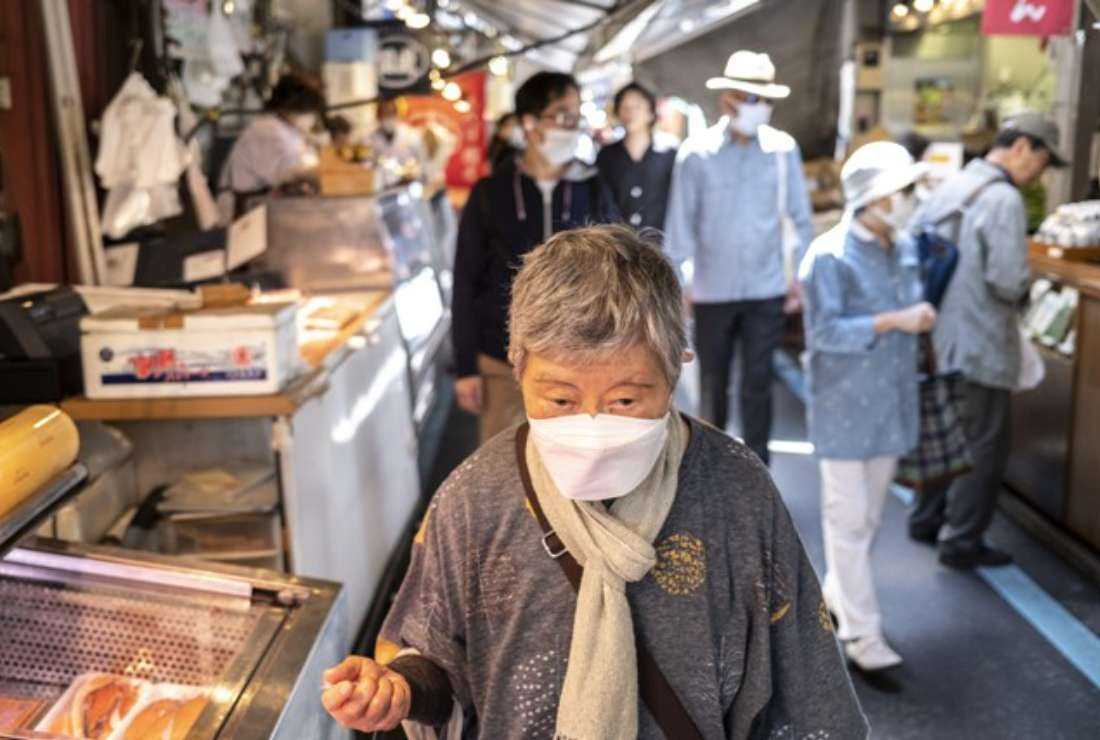
These deliberate inconveniences aim to slow decline of physical capabilities and promote self-reliance

An elderly Japanese woman walks through a street market in Tokyo's Tsukiji area on April 22, 2022. (Photo: AFP)
Japan, renowned for its rapidly aging society, faces unique challenges but also opportunities as its elderly population continues to grow.
In response to these changing demographics, the Japanese have embraced innovative approaches to cope with the demands of what is also a shrinking society and no, we are not talking about the use of robots.
One such movement gaining traction is advocacy for the 'benefit of inconvenience.'
Contrary to the prevailing belief that convenience equates to a better life, a professor at the Kyoto Institute of Technology has challenged this notion, shedding light on the profound practical and ethical implications it carries.
In modern society, the pursuit of convenience has been deeply ingrained. The emphasis on speed, efficiency, and ease has shaped our perception of progress and success.
However, this perspective may not align with the core needs of living beings, as Professor Keiko Nakamura, a researcher in biology, warns.
"As Japan grapples with an aging population, the concept of the benefit of inconvenience takes on particular significance"
For humans, in fact, the essence of life lies in the simple, yet essential, daily activities such as sleeping, eating and walking. These activities, often taken for granted, are the foundation of our well-being and growth.
The "benefit of inconvenience" challenges the conventional notion of convenience by exploring the advantages that arise from everyday difficulties.
Instead of prioritizing efficiency and instant gratification, this perspective encourages a shift in focus toward the inherent usefulness of struggle, effort and adaptability. This concept prompts us to reconsider the impact of excessive convenience on our physical and mental abilities, as well as our capacity for growth and self-sufficiency.
To understand how entrenched the concept of convenience in Japan’s culture is, take the word konbini, which stands for convenience store. And there are over 50,000 in Japan, all there for the express purpose to release the average Japanese from the most bothersome aspect of life. All in all, to make life the more convenient as possible, they are open 24 hours with food ready to consume on the spot.
But as Japan grapples with an aging population, the concept of the benefit of inconvenience takes on particular significance.
While the traditional approaches to supporting the elderly have often emphasized accessibility and care, aiming to alleviate burdens and improve quality of life, this movement prompts a re-evaluation of the potential unintended consequences of excessive convenience.
It advocates finding the right balance that promotes independence, self-reliance and personal growth among the elderly population.
This has led to the recent emergence of innovative solutions. One notable example is the concept of "barrier alleys" (bariaarii), which is intentionally incorporating small obstacles and challenges within buildings, especially in facilities catering to older adults.
"Excessive assistance can stifle their abilities and impede their mental capacities"
It is the opposite of something convenient. By providing opportunities for physical engagement and training, these deliberate inconveniences aim to slow the decline of physical capabilities and promote self-reliance among the elderly.
This approach has also led to the creation of designs and practices that encourage cognitive stimulation, motor skill development, and increased social interactions.
The aim is to foster a sense of purpose and literal empowerment (using strength when otherwise would not be required), countering the potential negative effects of over-reliance on convenience-driven solutions, like human helpers or advanced robots.
Within old age homes and hospitals, for example, there is a well-known saying: "Don't do for the elderly anything they can do for themselves."
This adage emphasizes the importance of preserving independence and initiative among the elderly, recognizing that excessive assistance can stifle their abilities and impede their mental capacities.
However, Japan is been used to a different approach, driven by the fear of potential lawsuits if an elderly individual were to harm themselves. This continuous assistance policy, although well-intentioned, raises concerns about its long-term impact on the autonomy and self-sufficiency of older adults.
Maintaining a delicate balance between providing the necessary support and fostering independence is essential when caring for the elderly. Encouraging self-sufficiency allows older adults to retain a sense of purpose and dignity. It acknowledges their capabilities and affirms their right to engage actively in daily tasks, decision-making, and the pursuit of personal interests.
This new approach could lead to a paradigm shift in health care.
Instead of focusing solely on avoiding legal risks, it is crucial to prioritize the long-term well-being and independence of older adults. This entails striking a balance between ensuring safety measures are in place while actively encouraging individuals to partake in activities that promote their cognitive, physical, and emotional well-being.
*The views expressed in this article are those of the author and do not necessarily reflect the official editorial position of UCA News.
Help us keep UCA News independent
The Church in Asia needs objective and independent journalism to speak the truth about the Church and the state.
With a network of professionally qualified journalists and editors across Asia, UCA News is just about meeting that need. But professionalism does not come cheap. We depend on you, our readers, to help maintain our independence and seek that truth.
A small donation of US$2 a month would make a big difference in our quest to achieve our goal.

Share your comments